Physical and Mental Rehabilitation
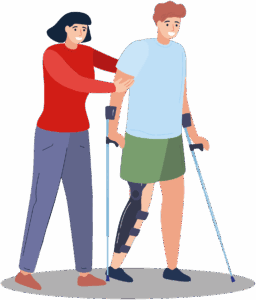
Physical and mental rehabilitation is a key focus area for the Ukrainian Red Cross. The programme was launched in May 2023 and has been implemented since February 2024. It covers a range of measures aimed at restoring and improving a person’s physical and psychological condition. The Ukrainian Red Cross provides free assistance to people who do not have access to the necessary rehabilitation services in their communities but need support after suffering from illness, injury, or the effects of war.
Our Impact:
Since 24 February 2022:
With our help:
These figures represent just a part of our ongoing efforts to assist individuals facing difficult life circumstances.
CONTACT INFORMATION
National
hotline of the Ukrainian
Red Cross
(Mon – Fri, 9:00 – 18:00)
Останні новини
Geography of activity
Regions Covered
The programme is currently active in 13 regions: Lviv, Volyn, Rivne, Khmelnytskyi, Ivano-Frankivsk, Ternopil, Mykolaiv, Poltava, Chernihiv, Odesa, Kharkiv, Zaporizhzhia, and Dnipro. To provide additional support, rehabilitation spaces have been established in the following locations:
- Mykolaiv region – Mykolaiv, Novyi Buh;
- Lviv region – Zhydachiv;
- Khmelnytskyi region – Stara Ushytsia, Letychiv, and Shepetivka;.
Main areas of activity
Main Areas of Activity
Community-Based Rehabilitation
Community-based rehabilitation (CBR) is a community development strategy aimed at improving the quality of life for people with disabilities and their families through social inclusion and equal opportunities. Originally launched by the World Health Organization (WHO) to improve access to rehabilitation services at the community level, CBR has since evolved into a comprehensive, multisectoral approach to inclusive development. It mobilises local resources and involves people with disabilities, their families, non-governmental organisations (NGOs), and government bodies responsible for health, education, social welfare, and vocational services. This strategy integrates individual support for beneficiaries, the provision of rehabilitation aids, training for professionals and the wider community, efforts to create an accessible environment, and the implementation of the UN Convention on the Rights of Persons with Disabilities.
Key Areas of Work
1. Mobile Rehabilitation Units. Mobile rehabilitation units operate directly in the homes of beneficiaries, delivering a comprehensive range of services:
- Physical rehabilitation – Between 3 and 12 therapy sessions are provided, depending on the rehabilitation prognosis, which takes into account the patient’s condition, motivation, and potential to regain function.
- Provision of rehabilitation aids – Specialists assess individual needs and may provide appropriate aids such as walkers, crutches, wheelchairs, handrails, shower chairs, and more. Equipment is supplied only after consultation with a qualified specialist.
- Assessment of the living environment – Specialists evaluate the beneficiary’s living conditions and, where necessary, offer recommendations to improve accessibility. Additional support equipment, such as ramps or handrails, may be provided.
- Psychosocial counselling – Support is offered to beneficiaries and their families to help them adapt to life changes and maintain motivation throughout the rehabilitation process.
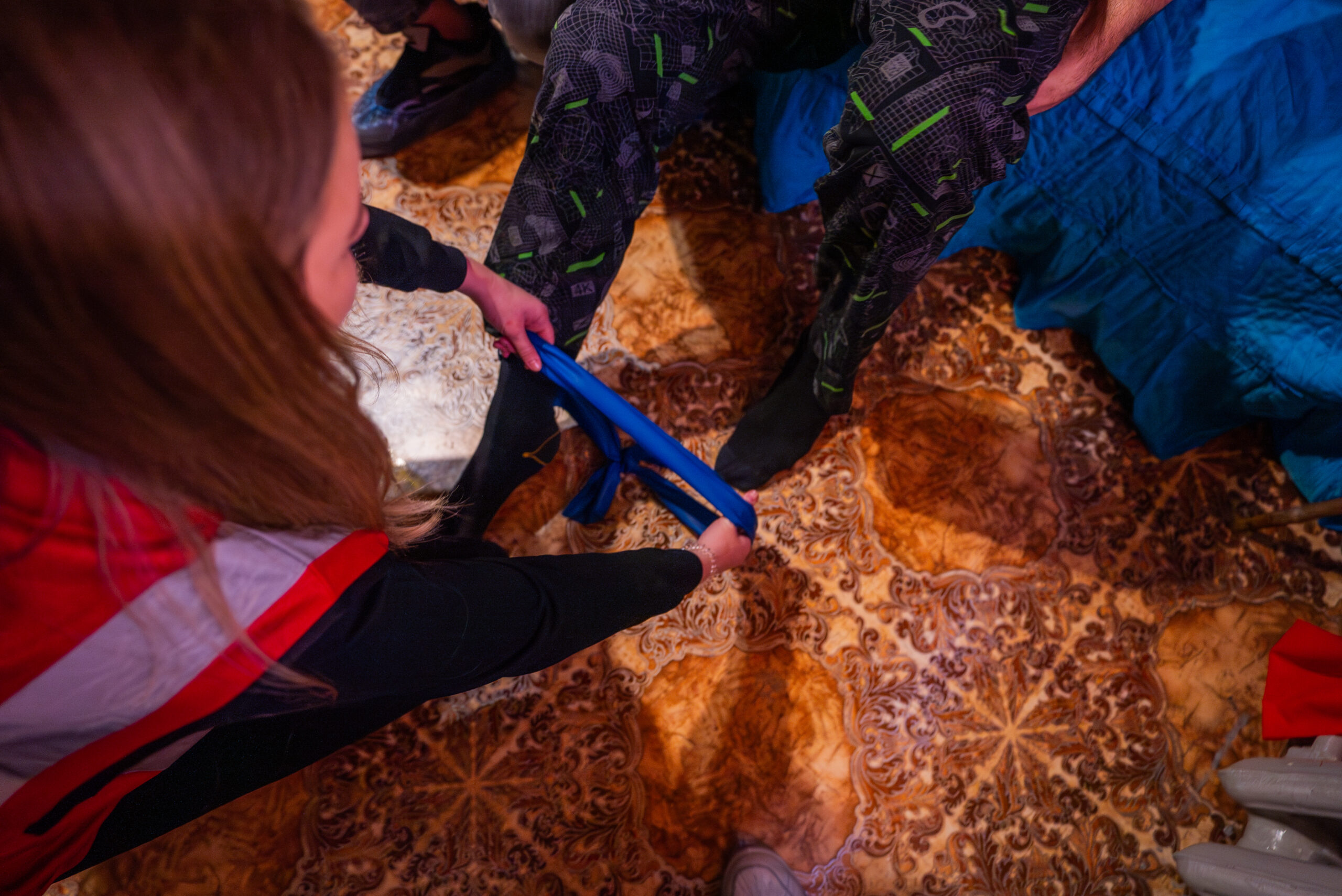
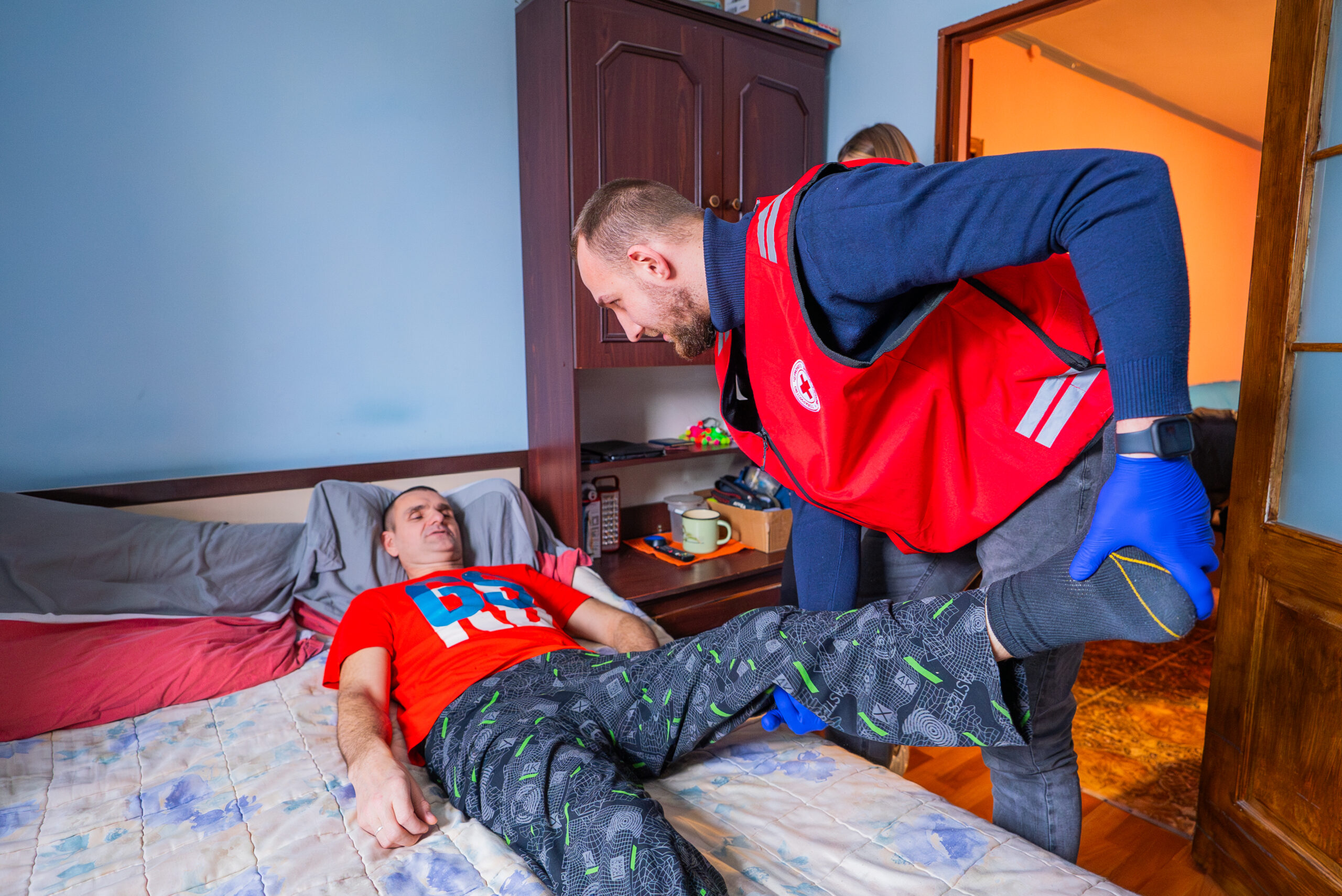
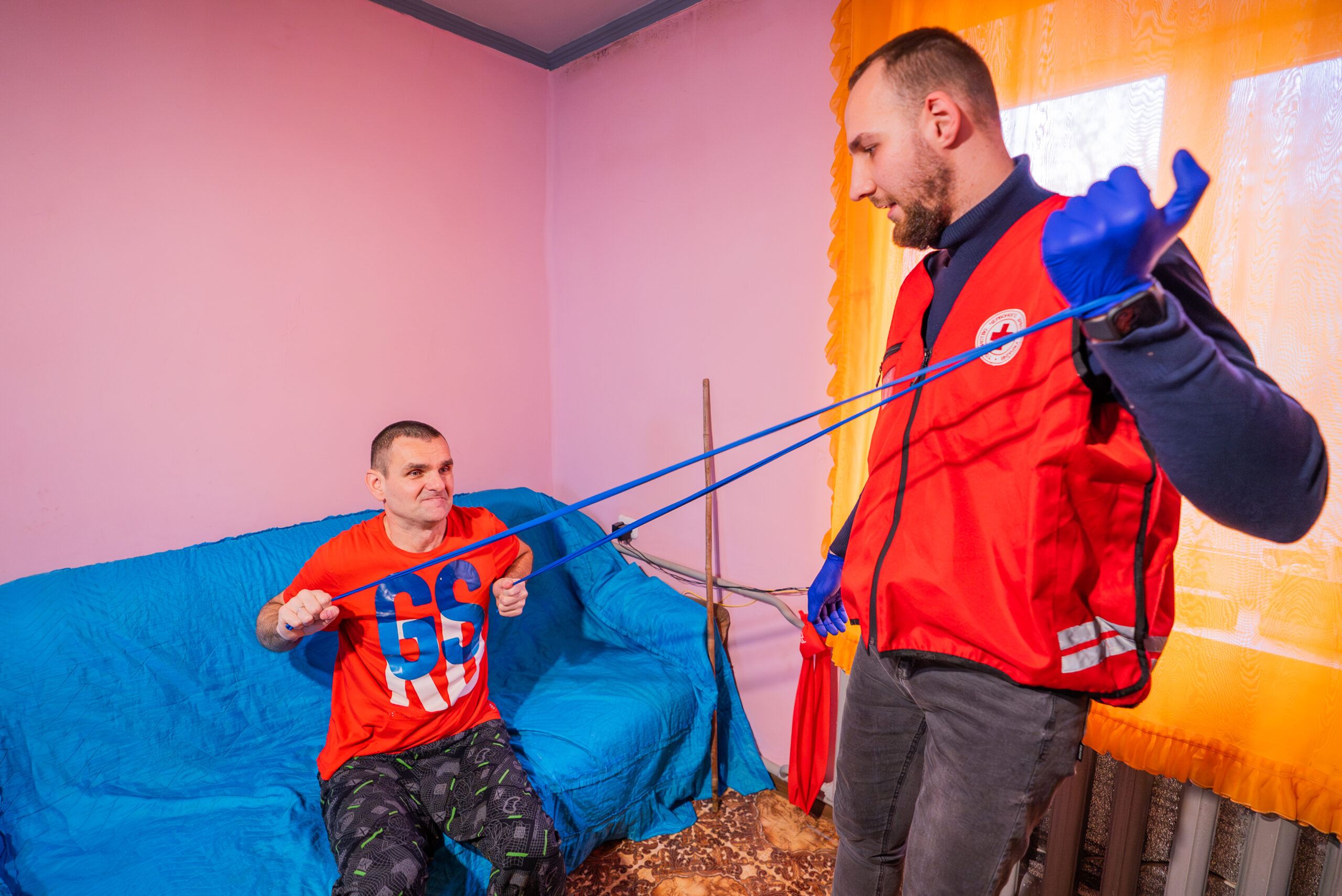
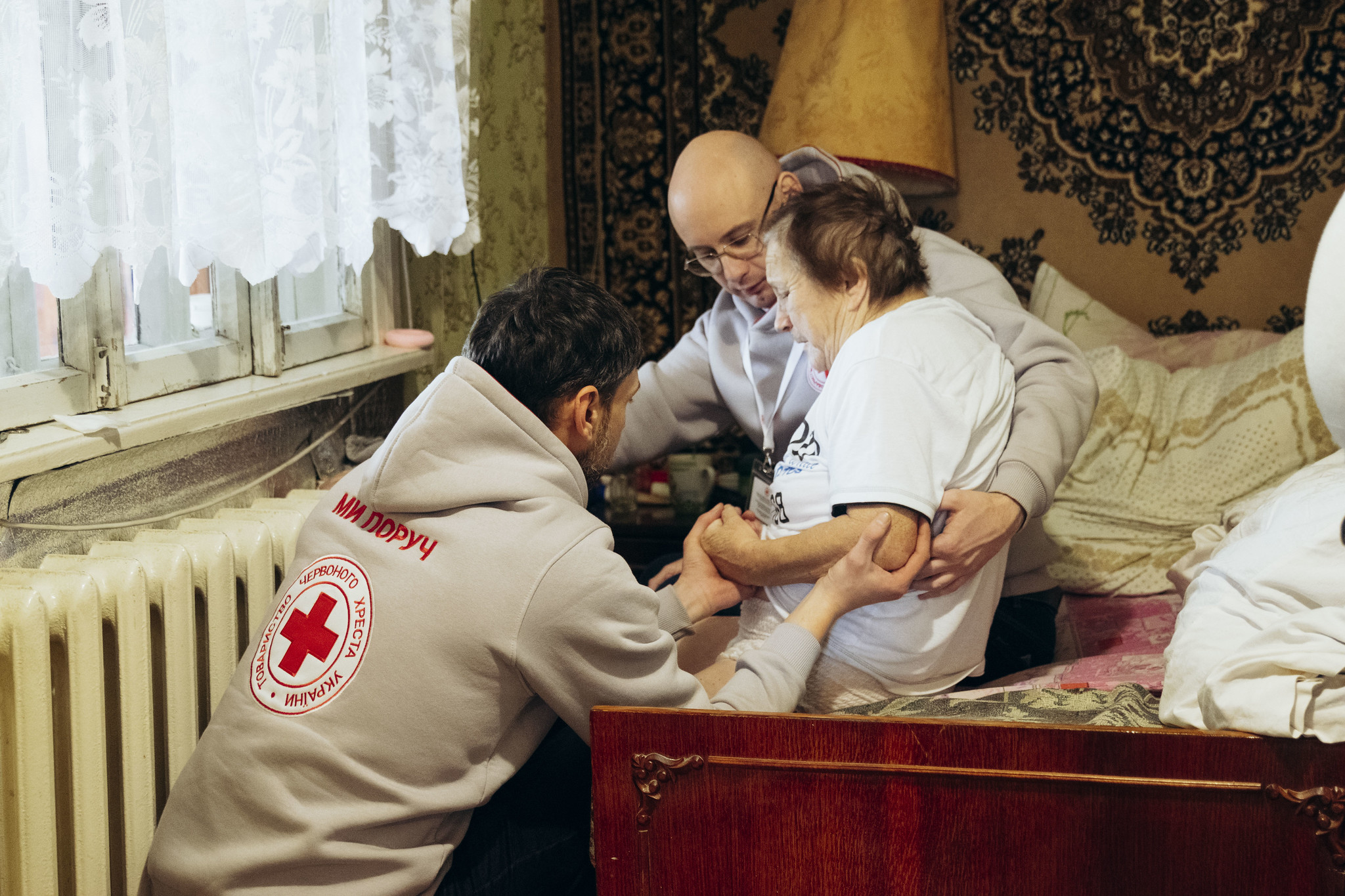
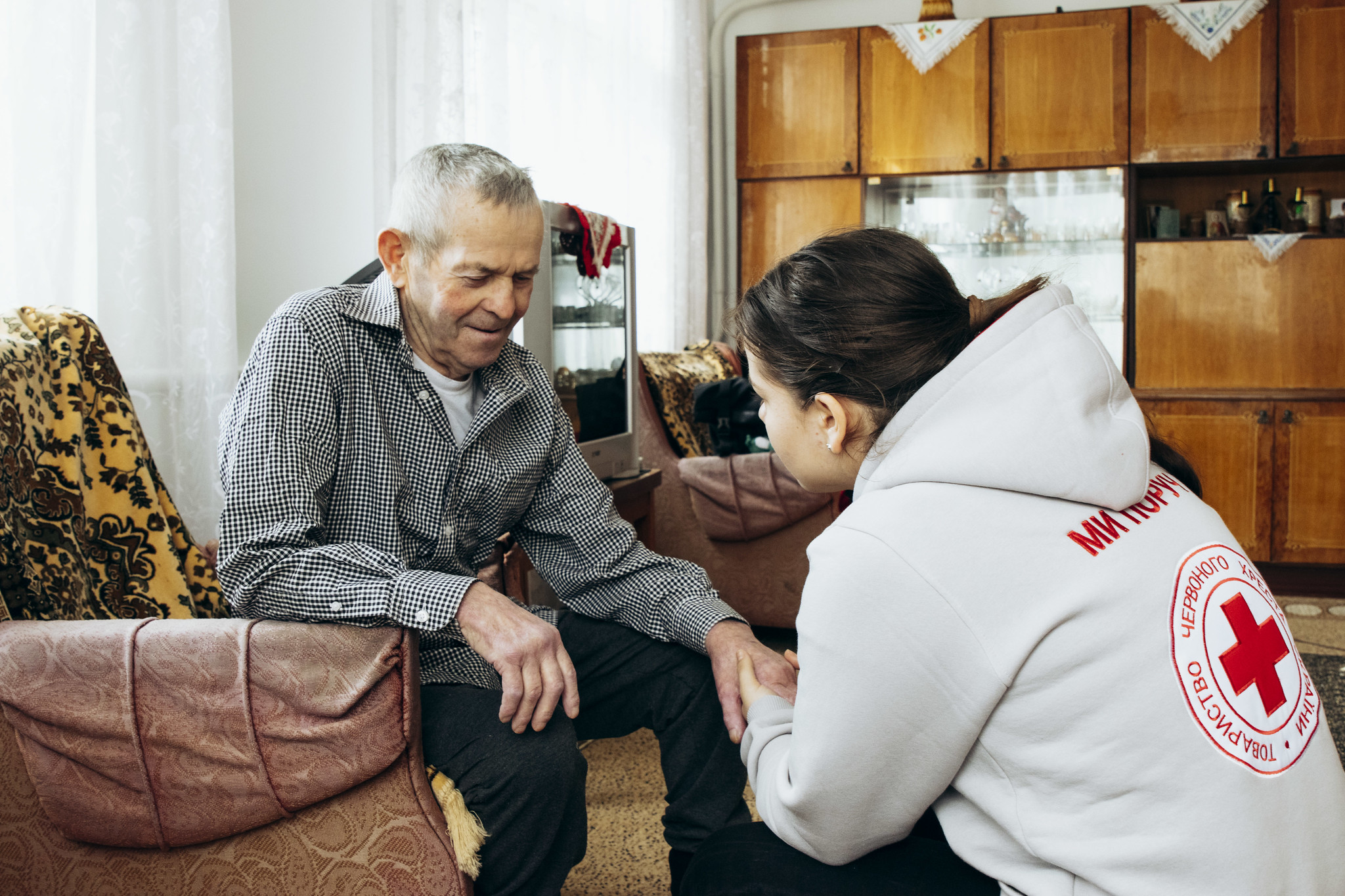
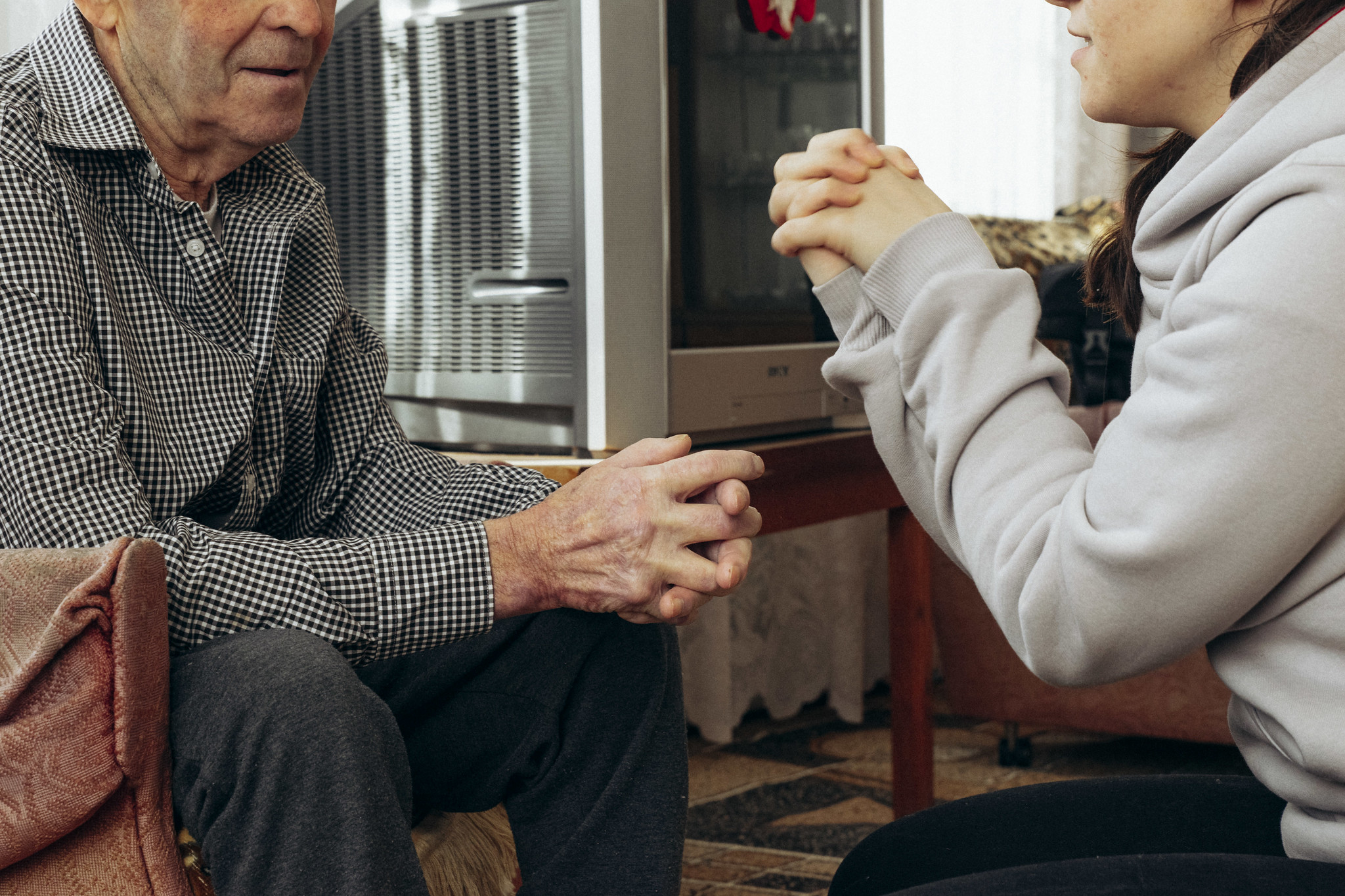
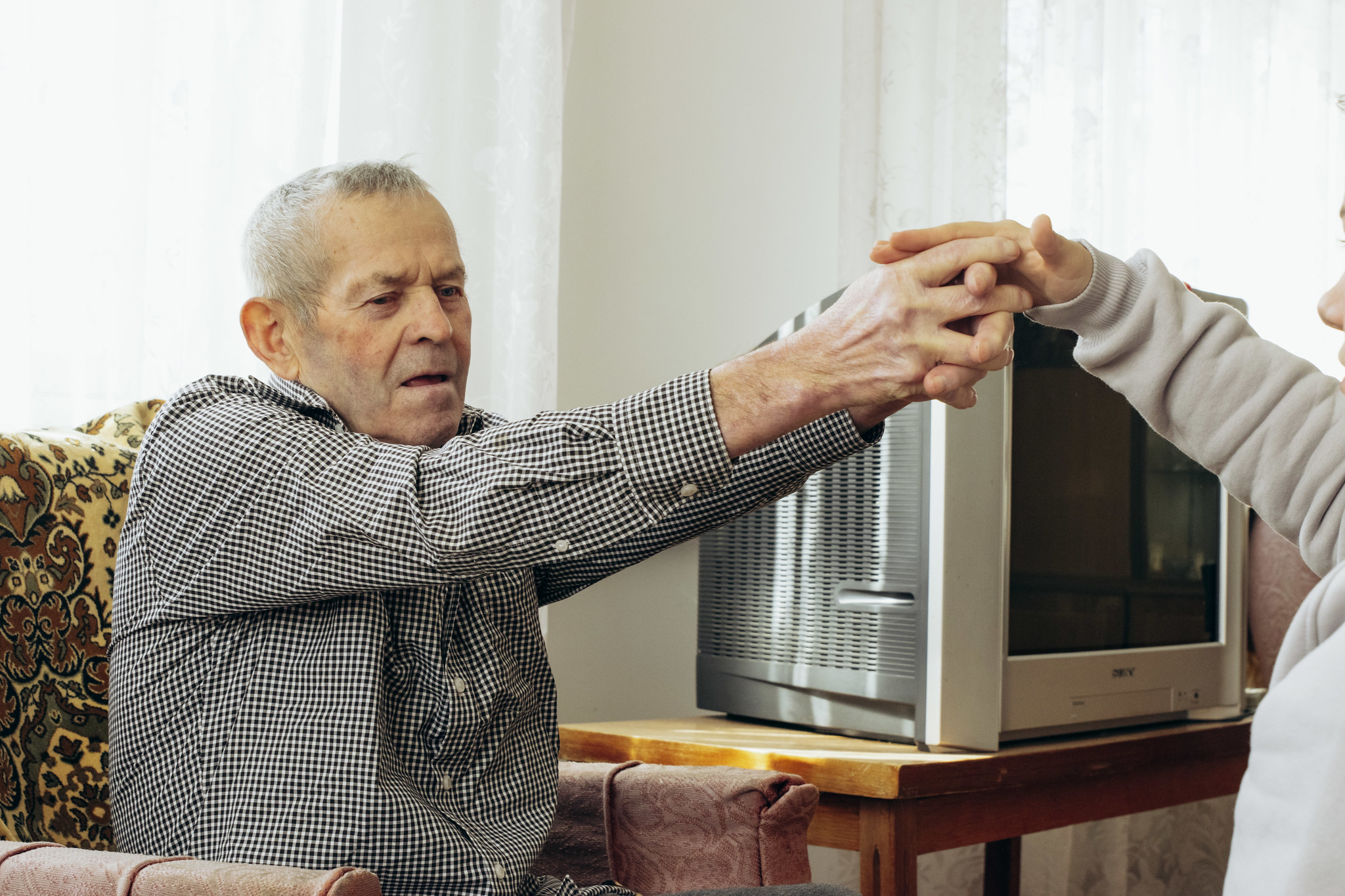
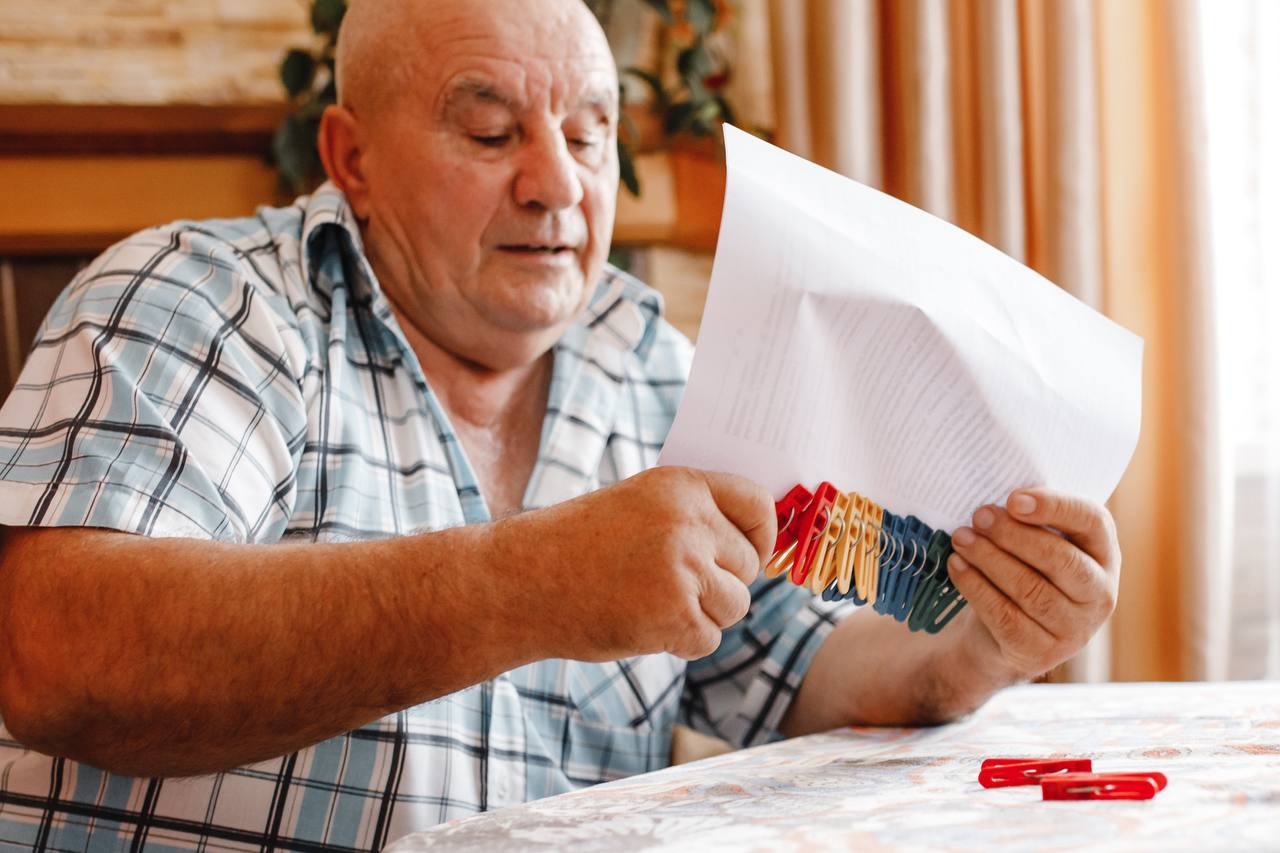
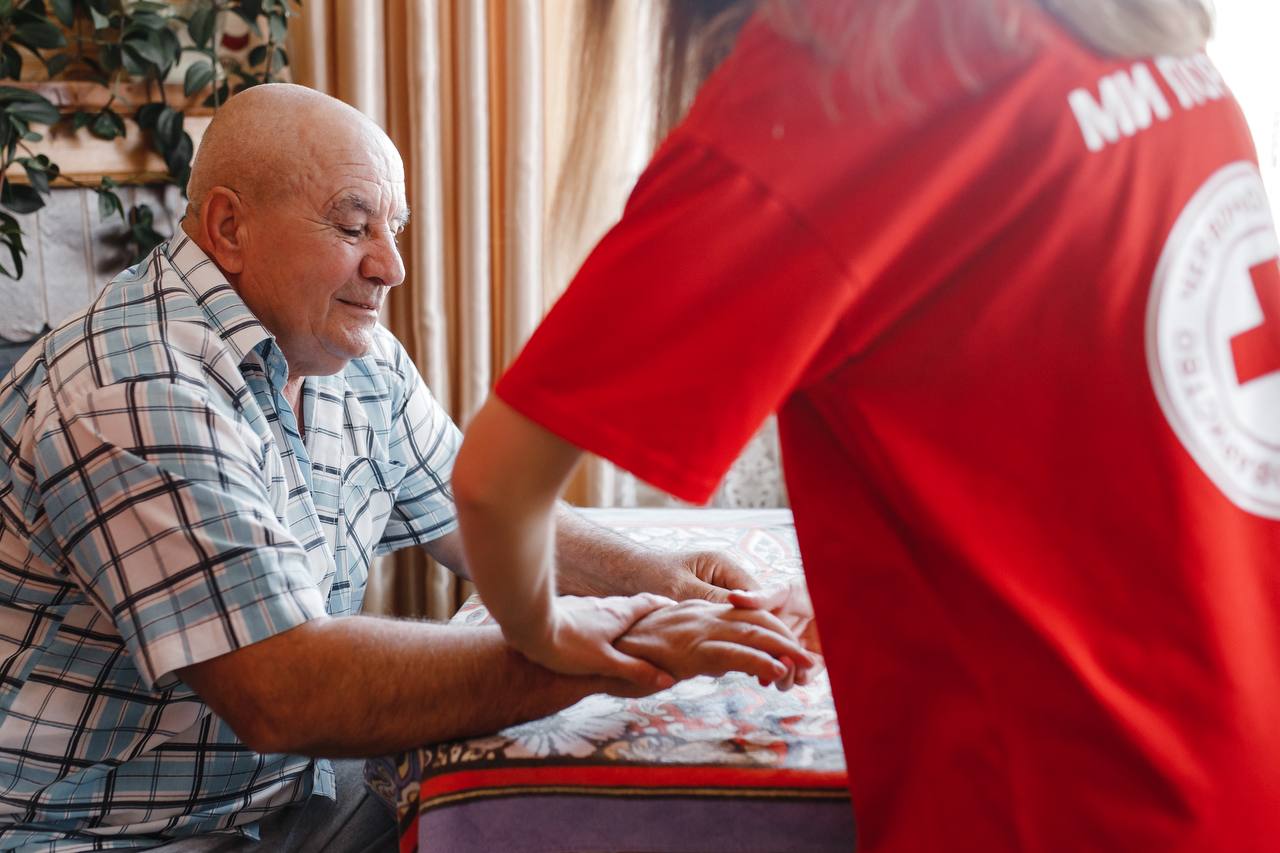
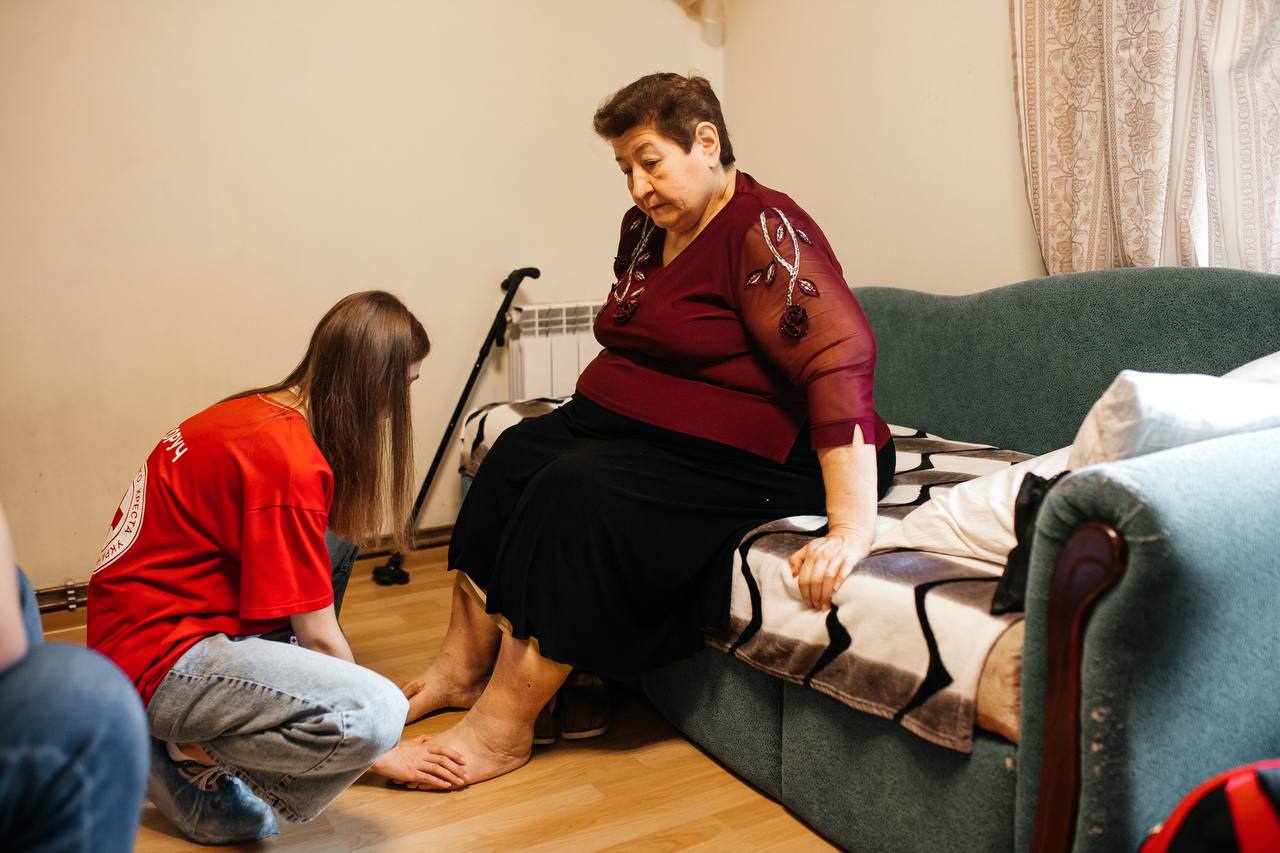
2. Raising Awareness
Information sessions are organised for relatives and carers of individuals requiring rehabilitation services, as well as for members of the wider community.
The session introduces the concept of community-based rehabilitation as a holistic approach to supporting individuals following injury or illness after discharge from the hospital. It emphasises the importance of using evidence-based rehabilitation methods and outlines various rehabilitation models, including medical, psychosocial, and physical approaches. The session also covers principles of effective support and the vital role of the community in fostering an inclusive environment, practical recommendations for improving accessibility and local infrastructure, and strategies for collaboration with governmental and non-governmental organisations.
This session focuses on appropriate communication with and about people with disabilities, tailored for adult participants. It emphasises tolerance, equality, and respect in all forms of interaction. The session offers practical guidance on engaging with individuals with different types of disabilities, including tips on offering assistance, using gestures, and employing alternative methods of communication.
Designed for children and young students, this session teaches how to communicate with and about people with disabilities. It introduces the concept of disability, challenges common myths, and highlights the importance of empathy. The session outlines appropriate ways to interact with individuals with various disabilities, provides examples of respectful and inappropriate behaviour, and shares stories of well-known people with disabilities. Interactive tasks are included to help participants understand how to support inclusion in everyday life.
This session is designed to promote effective and respectful communication with veterans, supporting their transition to civilian life. It includes practical recommendations on how to engage with veterans in a sensitive and supportive manner, avoid potentially distressing topics, and reduce stress during conversations. Special attention is given to communicating with veterans experiencing post-traumatic stress disorder (PTSD), preventing conflict, and creating a safe and comfortable space for dialogue.
This session helps participants understand what evidence-based rehabilitation means, which methods are genuinely effective, and which are based on myths. It explains, in clear and accessible language, why it is important to follow proven approaches, what effective rehabilitation looks like, and the roles played by the patient, their family, and a team of specialists.
This interactive session helps participants understand the main risk factors for heart disease and learn simple everyday ways to prevent it, such as healthy eating, regular physical activity, and managing weight and stress. Through practical exercises, participants will assess their own health and develop a personal action plan to maintain a healthy heart.
3. Training
Training is a key component of community-based rehabilitation activities. It focuses not only on providing individual support but also on raising awareness and strengthening professional capacity within the community. Training sessions are organised for mid-level medical personnel, social workers, and other specialists involved in physical and mental rehabilitation.
The transfer of patients is a vital aspect of the rehabilitation process. This training covers techniques for assisting people with limited mobility, including the use of assistive devices such as slide sheets and transfer boards. Emphasis is placed on the importance of ergonomics and correct body mechanics to prevent injury to both patients and carers. A range of transfer techniques is taught, including moving from lying to sitting, from bed to chair, and navigating stairs.
In this training, you will learn how to select, adjust, and use rehabilitation aids such as crutches, walkers, wheelchairs, and more. We will cover effective methods of use that help improve users’ mobility, prevent complications, and promote a more active social life. You will gain practical knowledge of how to choose and fit these devices correctly to ensure maximum effectiveness and avoid complications during use.
The Patient Care training will teach you how to carry out a range of activities aimed at preventing complications in people with limited mobility following serious injuries or illnesses. Special emphasis is placed on proper patient positioning to prevent pressure ulcers, correct bed positioning, and skin care. The training also highlights the importance of educating relatives and carers to ensure high-quality care for those with limited mobility.
This training focuses on preventing falls in older people. By the end of the course, you will understand why falls are a serious concern and who is most at risk. You will learn about the various risk factors (physiological, behavioural, and medication-related) that contribute to falls, and how to assess fall risk using specific tests. The training highlights the importance of exercise to improve balance and muscle strength and concludes with key prevention recommendations and advice on adopting an individualised approach.
This training focuses on managing shoulder pain following a stroke. It covers the main causes and types of pain, including articular, muscular, and pain associated with sensory changes and autonomic dysfunction. The issue of shoulder subluxation and its risk factors is discussed in detail. Participants will learn methods to assess joint condition and explore treatment options such as exercise, taping, electrical stimulation, botulinum toxin, and the use of supportive bandages. The training places particular emphasis on pain prevention through correct positioning, care, and movement control.
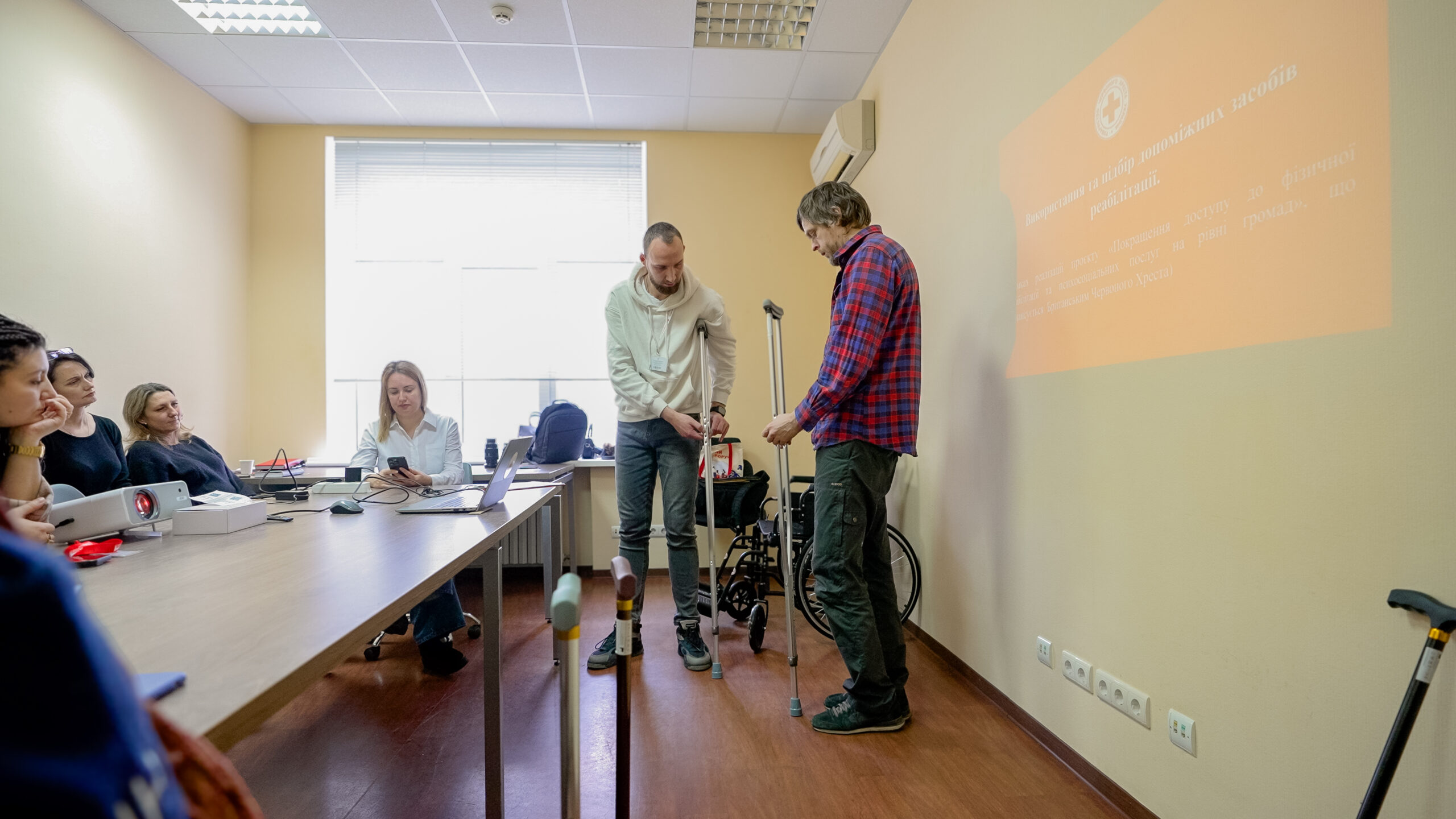
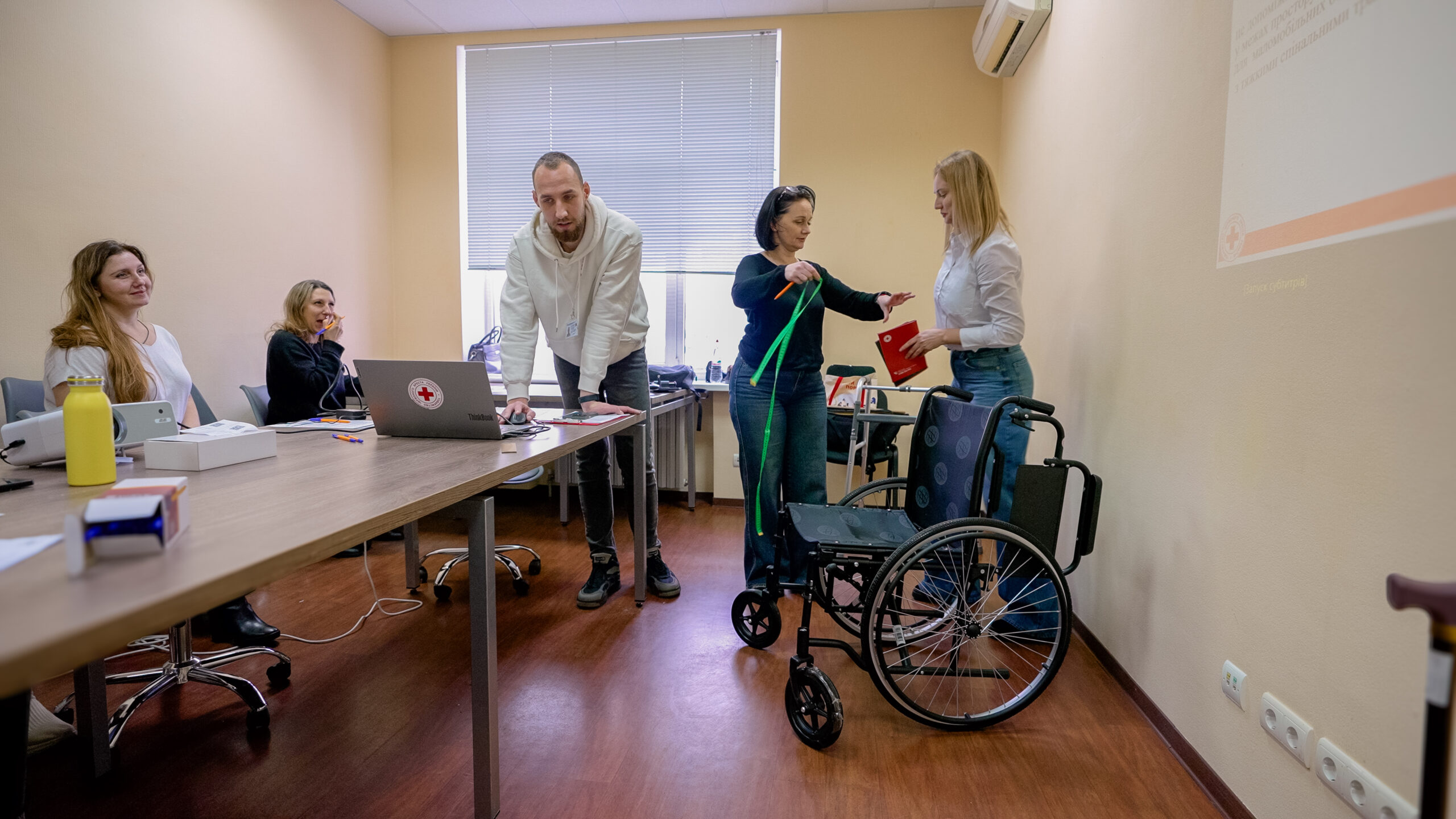
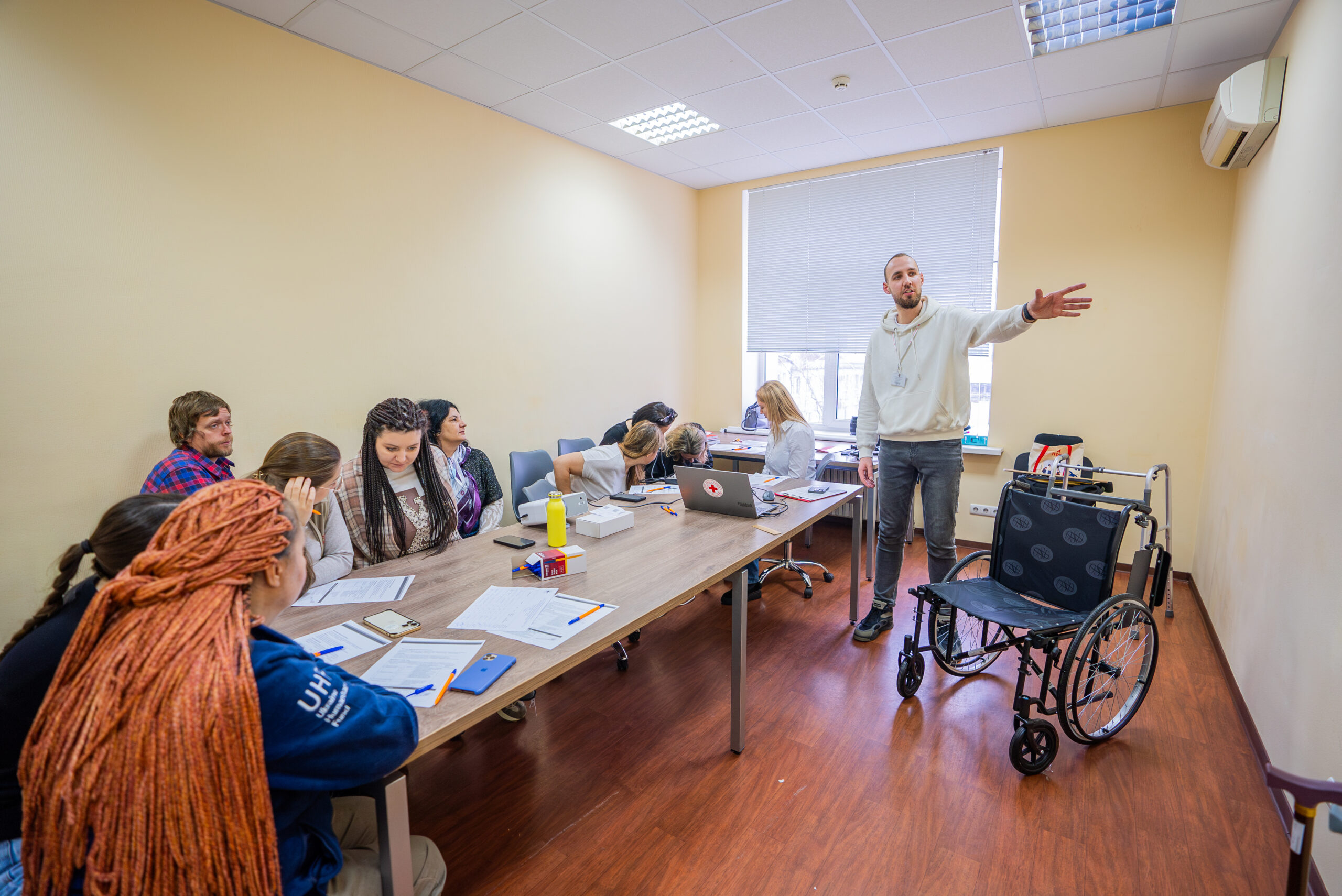
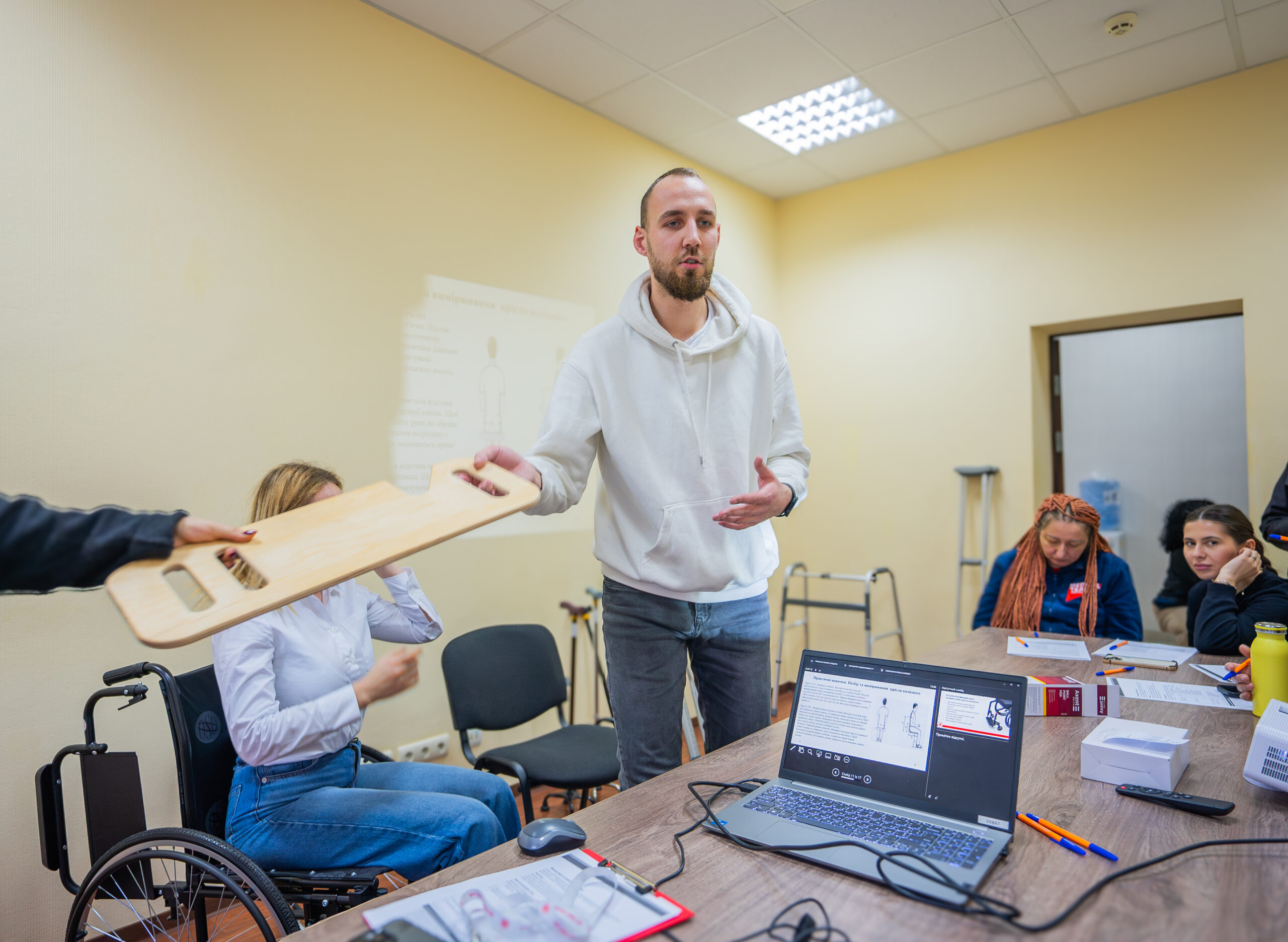
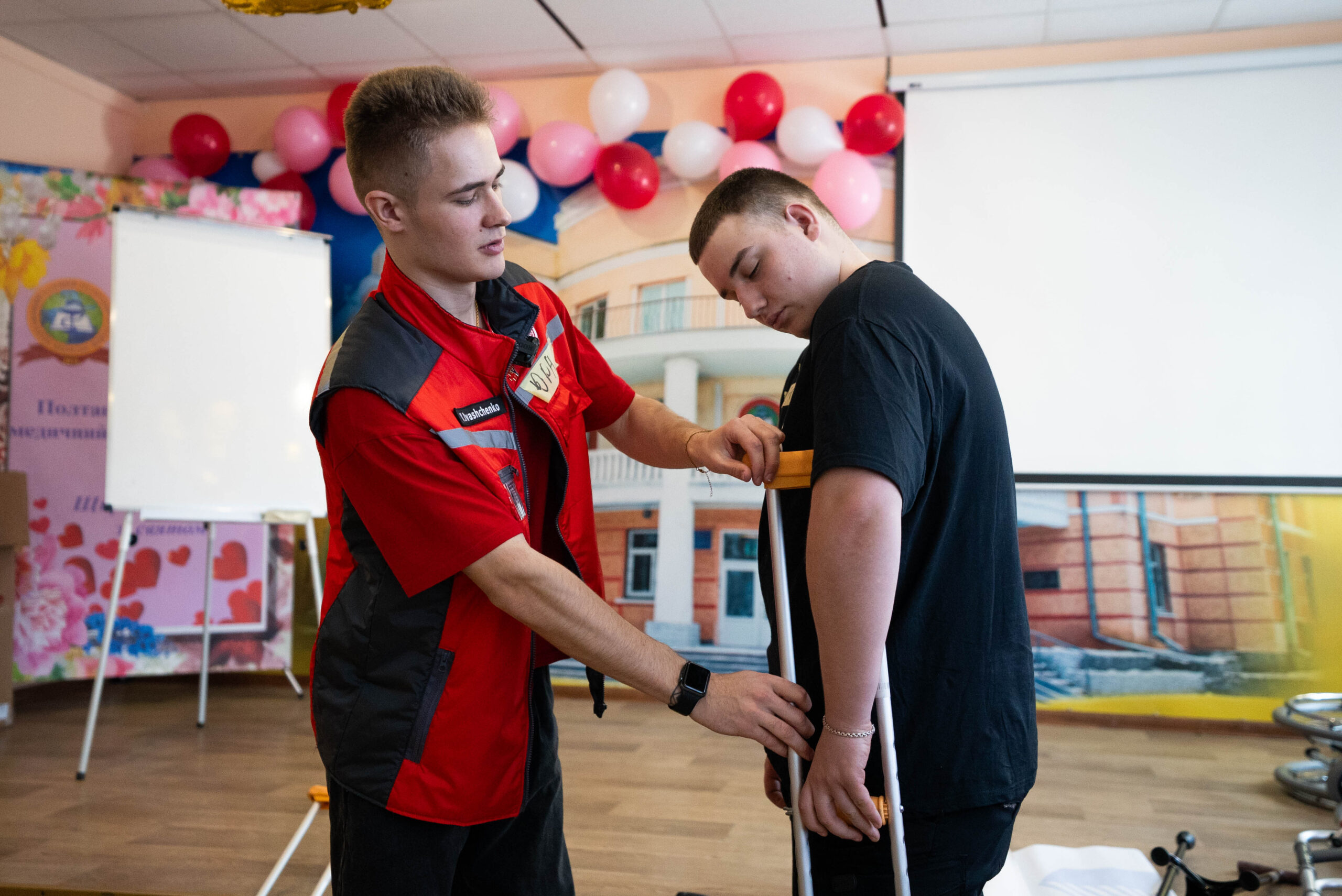
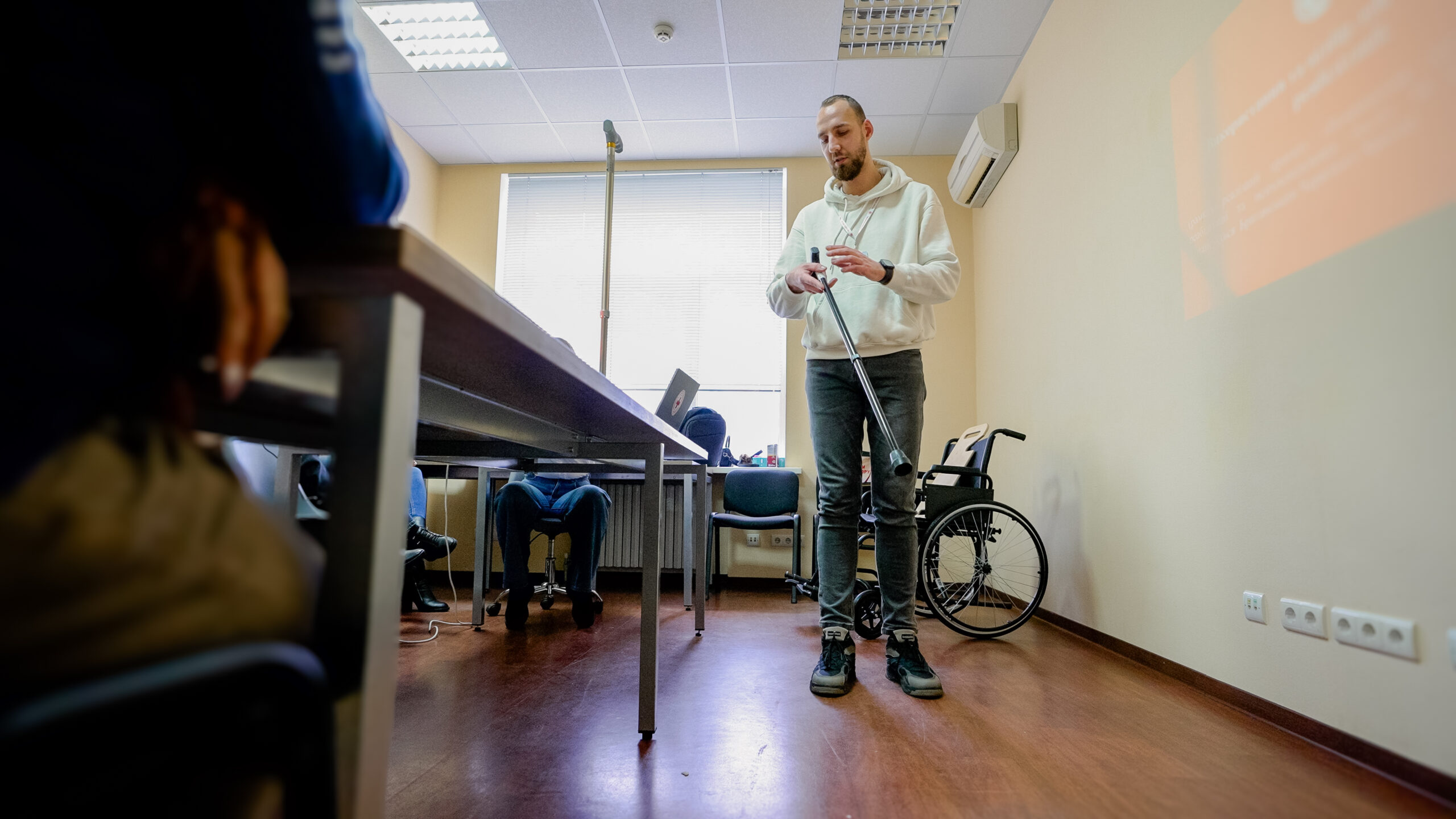
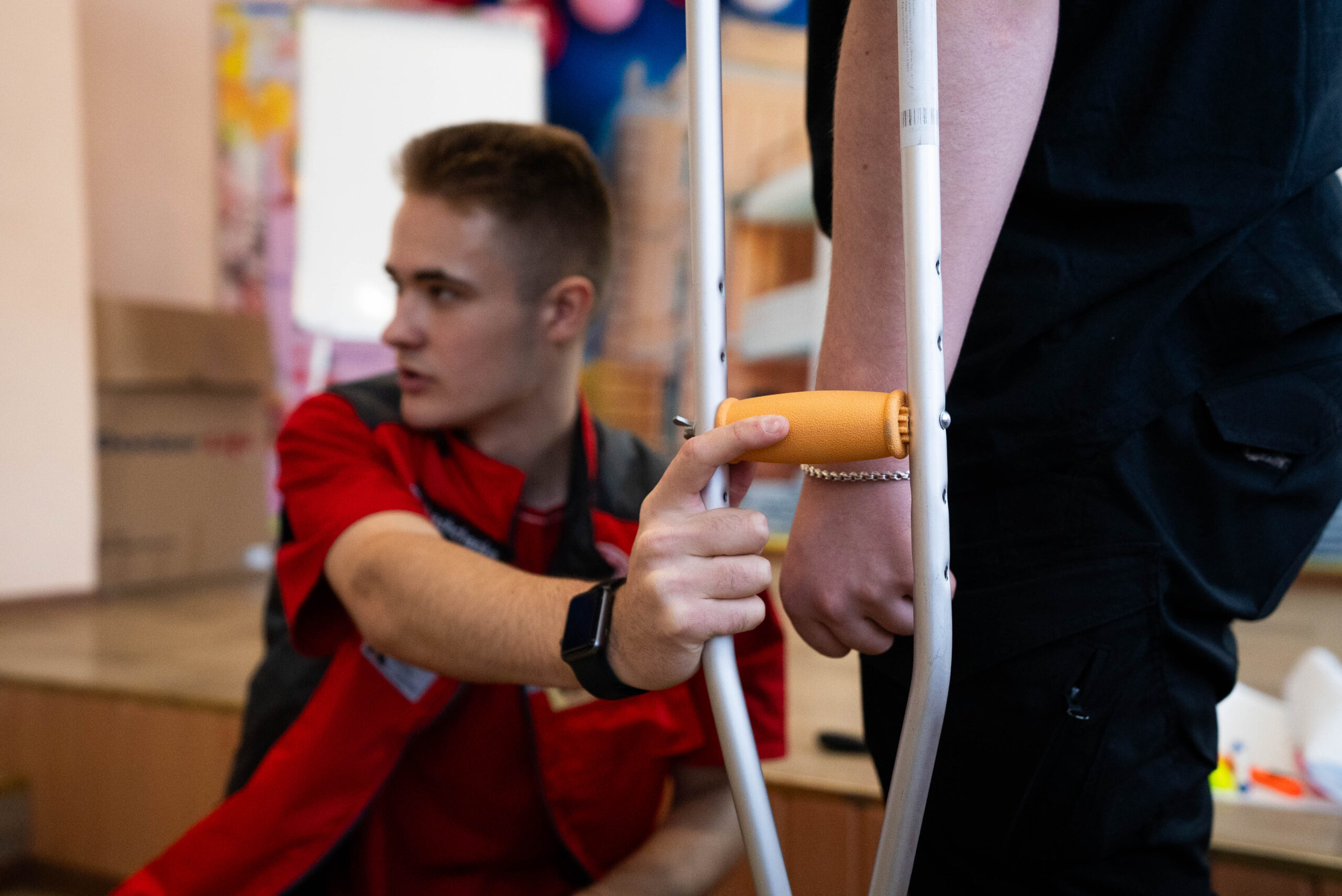
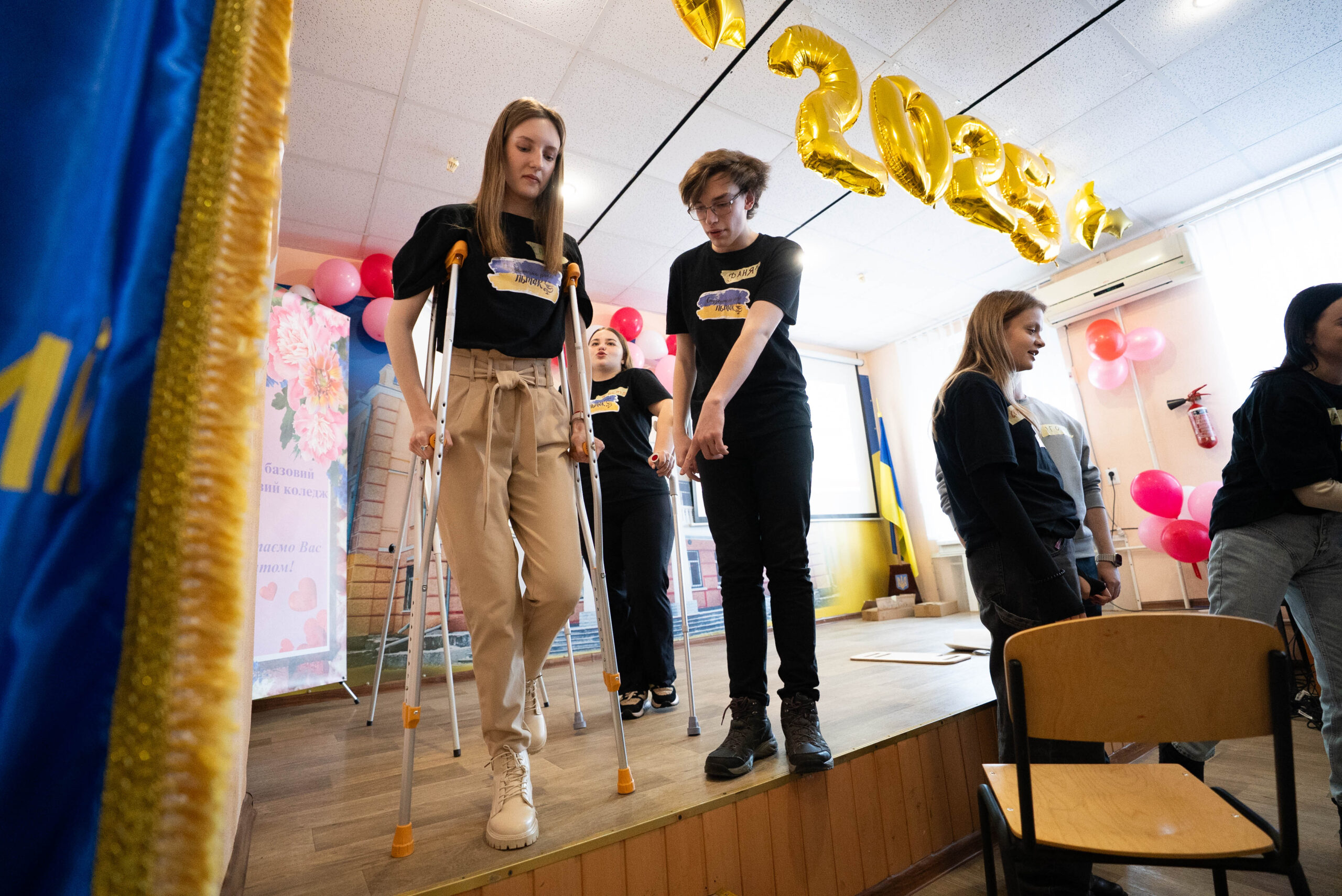
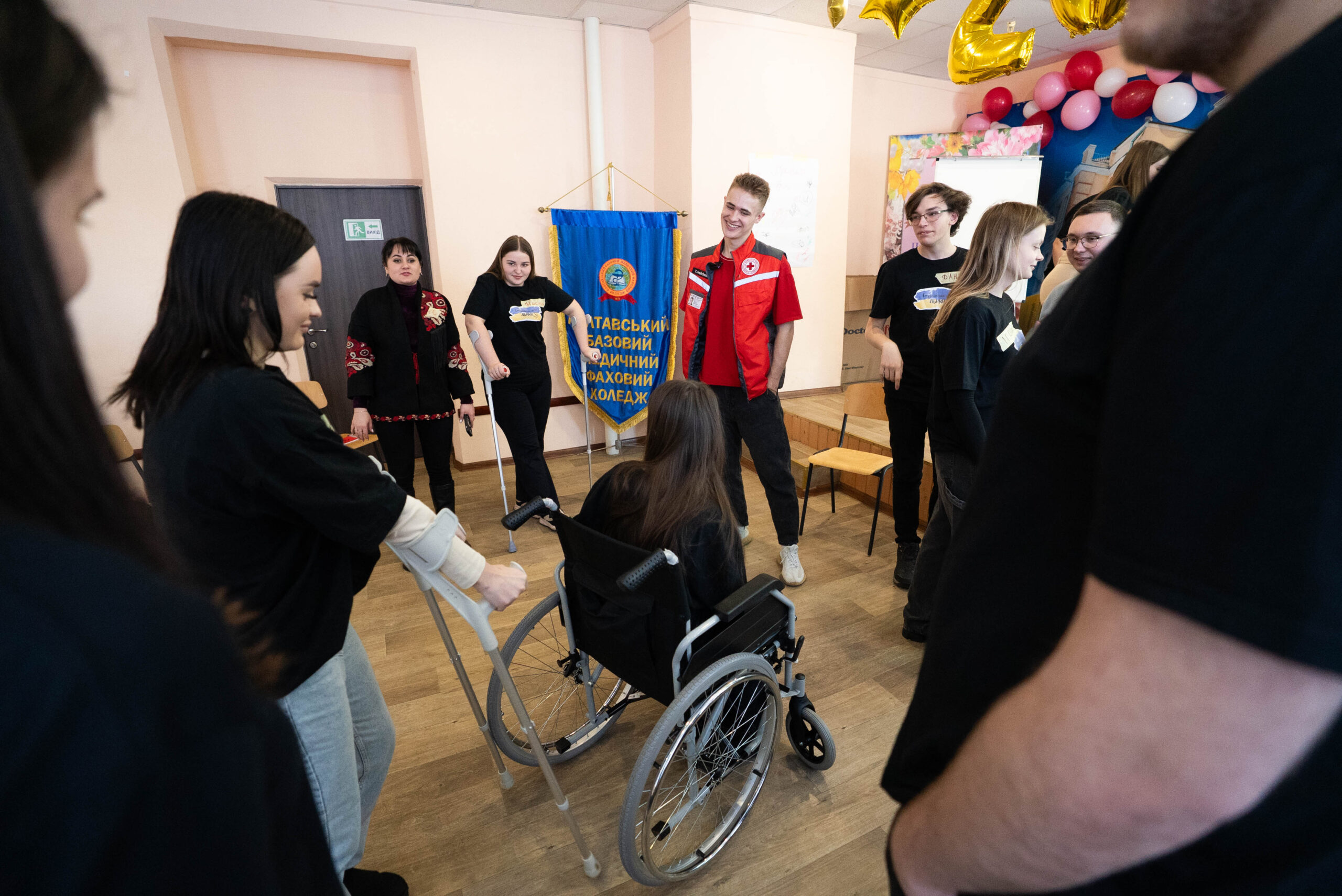
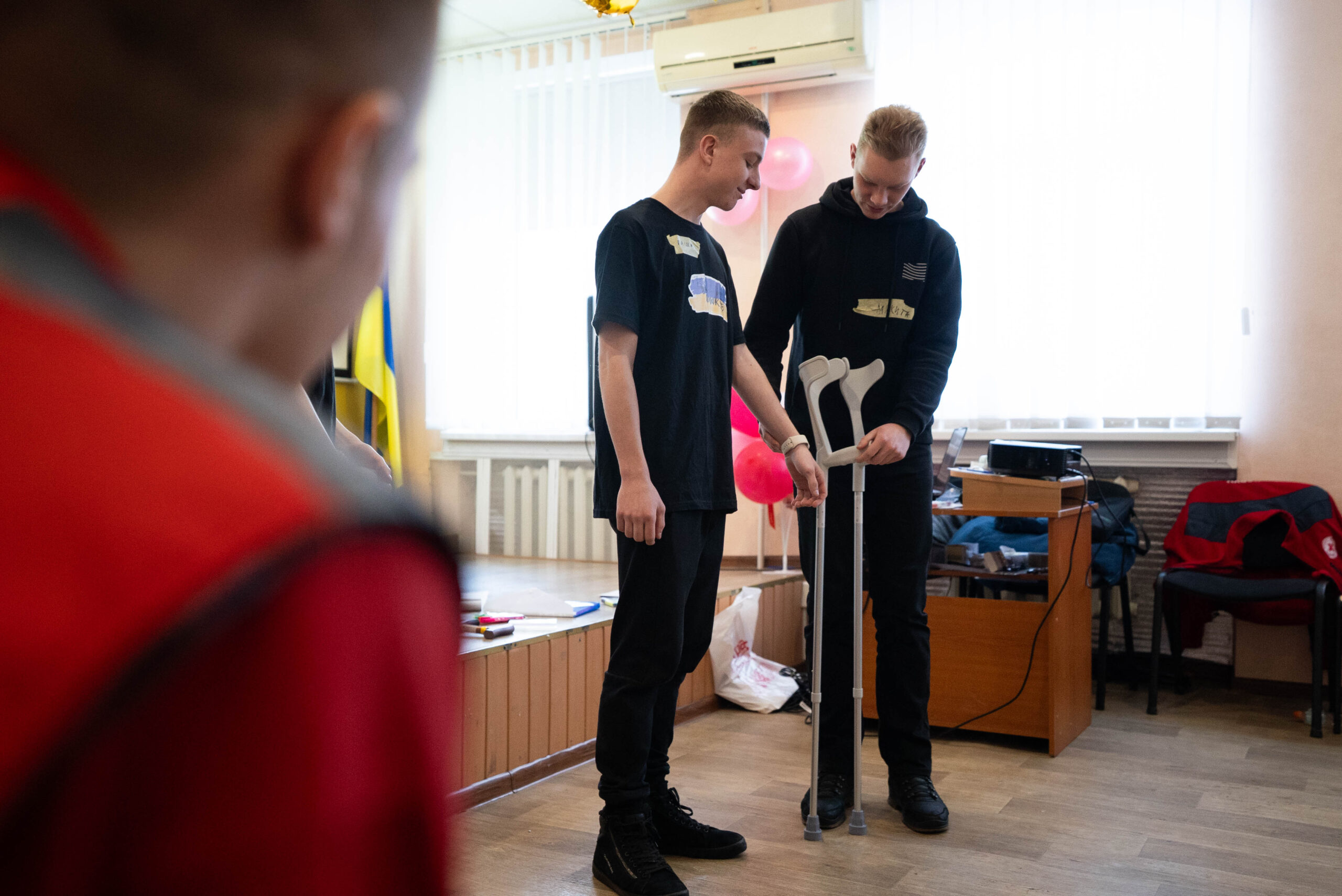
Frequently Asked Questions (FAQs)
Rehabilitation services are available to demobilised, retired, and discharged military personnel, as well as individuals who need to restore lost motor function, improve mobility, or support their emotional recovery following traumatic brain injuries, fractures, strokes, surgeries, or other health conditions requiring rehabilitation.
You can access rehabilitation services by calling the Ukrainian Red Cross hotline at 0 800 332 656.
Yes, all rehabilitation services are provided free of charge.
To receive rehabilitation services, you may need to provide an identity document and sign a consent form for the processing of personal data. This form is usually signed on-site.
Yes. Mobile rehabilitation units provide services to remote communities, especially those outside large cities where rehabilitation support is otherwise unavailable.
Mobile rehabilitation units assess the beneficiary’s needs, considering indications, contraindications, and their functional condition. Following the assessment, the beneficiary can submit an application for an assistive device through the Ukrainian Red Cross. Relevant documents are then signed in two copies.
You can order a training package by contacting the regional coordinator via the Ukrainian Red Cross hotline at 0 800 332 656.
Please contact the regional coordinator through the Ukrainian Red Cross hotline at 0 800 332 656.
